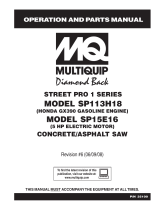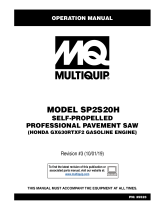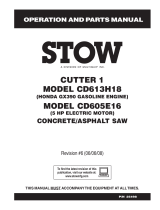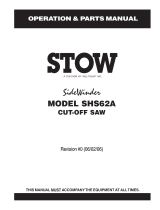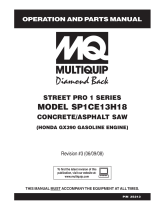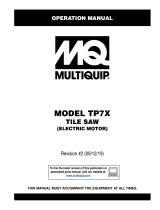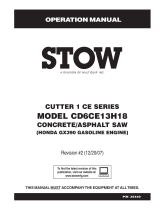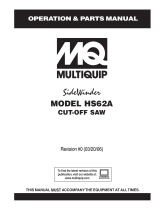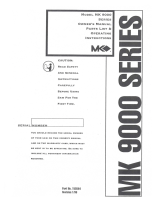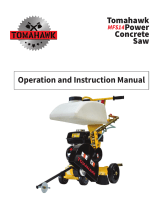Page is loading ...

THIS MANUAL MUST ACCOMPANY THE EQUIPMENT AT ALL TIMES.
To find the latest revision of this
publication, visit our website at:
www.multiquip.com
OPERATION AND PARTS MANUAL
Revision #1 (05/17/10)
SP2 StreetPro SERIES
MODEL SP2S13H20A
SELF-PROPELLED
PROFESSIONAL PAVEMENT SAW
(HONDA GX390K1QWT2 GASOLINE ENGINE)
P/N 38263

PAGE 2 — SP2S13H20A SAW — OPERATION AND PARTS MANUAL — REV. #1 (05/17/10)
PROPOSITION 65 WARNING
Engine exhaust and some of
its constituents, and some dust created
of California to cause cancer, birth
defects and other reproductive harm.
by power sanding, sawing, grinding,
drillingandotherconstructionactivities
contains chemicals known to the State
Some examples of these chemicals are:
Leadfromlead-basedpaints.
Crystallinesilicafrombricks.
Cementandothermasonryproducts.
Arsenicandchromiumfromchemically
treatedlumber.
Your risk from these exposures varies,
dependingonhowoftenyoudothistype
of work. To reduce your exposure to
these chemicals: work in aALWAYS
well ventilated area, and work with
approved safety equipment, such as
dust masks that are specially designed
to filter out microscopic particles.

SP2S13H20A SAW — OPERATION AND PARTS MANUAL — REV. #1 (05/17/10) — PAGE 3
Grinding/cutting/drilling of masonry, concrete, metal and
other materials with silica in their composition may give
off dust or mists containing crystalline silica. Silica is a
basic component of sand, quartz, brick clay, granite and
numerous other minerals and rocks. Repeated and/or
substantial inhalation of airborne crystalline silica can
cause serious or fatal respiratory diseases, including
silicosis. In addition, California and some other
authorities have listed respirable crystalline silica as a
substance known to cause cancer. When cutting such
materials, always follow the respiratory precautions
mentioned above.
WARNING
Grinding/cutting/drilling of masonry, concrete, metal and
other materials can generate dust, mists and fumes
containing chemicals known to cause serious or fatal
injury or illness, such as respiratory disease, cancer,
birth defects or other reproductive harm. If you are
unfamiliar with the risks associated with the particular
process and/or material being cut or the composition of
the tool being used, review the material safety data
sheet and/or consult your employer, the material
manufacturer/supplier, governmental agencies such as
OSHA and NIOSH and other sources on hazardous
materials. California and some other authorities, for
instance, have published lists of substances known to
cause cancer, reproductive toxicity, or other harmful
effects.
Control dust, mist and fumes at the source where
possible. In this regard use good work practices and
follow the recommendations of the manufacturers or
suppliers, OSHA/NIOSH, and occupational and trade
associations. Water should be used for dust
suppression when wet cutting is feasible. When the
hazards from inhalation of dust, mists and fumes cannot
be eliminated, the operator and any bystanders should
always wear a respirator approved by NIOSH/MSHA for
the materials being used.
WARNING
SILICOSIS WARNING RESPIRATORY HAZARDS
SILICOSIS/RESPIRATORY WARNINGS

PAGE 4 — SP2S13H20A SAW — OPERATION AND PARTS MANUAL — REV. #1 (05/17/10)
TABLE OF CONTENTS
SP2S13H20A StreetPro Saw
Proposition 65 Warning ........................................... 2
Silicosis/Respiratory Warnings ................................ 3
Table Of Contents ................................................... 4
Parts Ordering Procedures ..................................... 5
Specifications .......................................................... 6
Dimensions ............................................................. 7
Safety Message Alert Symbols ............................ 8-9
Rules For Safe Operation ................................ 10-12
Major Components ............................................... 14
13HP Honda Engine Components ........................ 15
General Information .............................................. 16
Inspection ......................................................... 18-19
Inspection -Blade .................................................. 20
Inspection - Blade Placement ............................... 21
Inspection -Guards, Covers & Belts ...................... 22
Inspection - BeLts & Water Tank ........................... 23
Manual Start-Up .............................................. 24-25
Shut-Down Procedures ......................................... 26
Operation ......................................................... 28-31
Maintenance .................................................... 32-36
13HP Engine Wiring Diagram (Recoil Start) ......... 37
Troubleshooting (Engine) ................................. 38-39
Troubleshooting (Blade) ........................................ 40
Explanation Of Code In Remarks Column ............ 42
Suggested Spare Parts ......................................... 43
Component Drawings
Name Plate And Decals ................................... 44-45
Under Carriage Assembly ................................ 46-47
Blade Shaft Assembly ...................................... 48-49
Lifting Bale Assembly ....................................... 50-51
Console Assembly ........................................... 52-53
13hp Honda Engine Mount Assembly ............ 54-55
Engine Assembly ............................................. 56-57
Pointers And Covers Assembly ........................ 58-59
Water System Assembly .................................. 60-61
Blade Guard Assembly .................................... 62-63
Manual Raise And Lower Assembly (20 In. ) ... 64-65
Battery Assembly ............................................. 66-67
Transmission Engage Lever Assembly ............ 68-69
Hydrostatic Transmission Assembly ................. 70-71
Hydrostatic Drive Assembly ............................. 72-73
Honda Gx390k1qwt2 Engine
Air Cleaner Assembly....................................... 74-75
Camshaft Assembly ......................................... 76-77
Carburetor Assembly ....................................... 78-79
Control Assembly ............................................. 80-81
Crankcase Assembly ....................................... 82-83
Crankshaft Assembly ....................................... 84-85
Cylinder Barrel Assembly ................................. 86-87
Cylinder Head Assembly .................................. 88-89
Fan Cover Assembly ........................................ 90-91
Flywheel Assembly .......................................... 92-93
Fuel Tank Assembly ......................................... 94-95
Ignition Coil Assembly ...................................... 96-97
Muffler Assembly ............................................. 98-99
Piston Assembly ........................................... 100-101
Recoil Stater Assembly ................................ 102-103
Labels Assembly .......................................... 104-105
Terms And Conditions Of Sale — Parts .............. 106

SP2S13H20A SAW — OPERATION AND PARTS MANUAL — REV. #1 (05/17/10) — PAGE 5
www.multiquip.com
Ordering parts has never been easier!
Choose from three easy options:
WE ACCEPT ALL MAJOR CREDIT CARDS!
When ordering parts, please supply:
R Dealer Account Number
R Dealer Name and Address
R Shipping Address (if different than billing address)
R Return Fax Number
R Applicable Model Number
R Quantity, Part Number and Description of Each Part
R Specify Preferred Method of Shipment:
UPS/Fed Ex DHL
N Priority One Tr u c k
N Ground
N Next Day
N Second/Third Day
If you have an MQ Account, to obtain a Username
and Password, E-mail us at: parts@multiquip.
com.
To obtain an MQ Account, contact you
r
District Sales Manager for more information.
Order via Internet (Dealers Only):
Order parts on-line using Multiquip’s SmartEquip website!
N View Parts Diagrams
N Order Parts
N Print Specification Information
Note: Discounts Are Subject To Change
Goto www.multiquip.com and click on
Order Parts
to log in and save!
Use the internet and qualify for a 5% Discount
on Standard orders for all orders which include
complete part numbers.*
Order via Fax (Dealers Only):
All customers are welcome to order parts via Fax.
Domestic (US) Customers dial:
1-800-6-PARTS-7 (800-672-7877)
Fax your order in and qualify for a 2% Discount
on Standard orders for all orders which include
complete part numbers.*
Order via Phone:
Domestic (US) Dealers Call:
1-800-427-1244
Best Deal!
International Customers should contact
their local Multiquip Representatives for
Parts Ordering information.
Non-Dealer Customers:
Contact your local Multiquip Dealer for
parts or call 800-427-1244 for help in
locating a dealer near you.
Note: Discounts Are Subject To Change
Effective:
January 1
st
, 2006
NOTICE
All orders are treated as Standard Orders and will
ship the same day if received prior to 3PM PST.
PARTS ORDERING PROCEDURES

PAGE 6 — SP2S13H20A SAW — OPERATION AND PARTS MANUAL — REV. #1 (05/17/10)
SPECIFICATIONS
SpecificationsTable 1.
Model
SP2S13H20A
Blade Capacity in. (mm)
20 in. (508 mm)
Cutting Depth in. (mm)
7.5 in. (191 mm)
Front Wheels in. (mm)
5 in. Dia x 2 in. Wide (127 mm x 51 mm)
Rear Wheels in. (mm)
8 in. Dia x 2 in. Wide (203 mm x 51 mm)
Weight lbs. (kg)
280 lbs. (127 kg)
Engine
Honda 13 HP
GX390K1QWT2
Gasoline Engine
Table 2. Engine Specifications
Engine Model
Honda GX390K1QWT2
Engine Type
Air-cooled 4-stroke Single Cylinder OHV
Horizontal Shaft Engine
Bore x Stroke
3.5 in. x 2.5 in. (88 mm x 64 mm)
Displacement
23.7 cu. in. (389 cc)
Maximum Power Output
13 HP/3600 RPM
Maximum Torque
19.5 ft-lbs. (2500 RMP)
2.7 kg-m (2500 RPM)
Idle Speed
1400 ± 150 RPM
Maximum No Load RPM
3600 ± 100 RPM
Specific Fuel Consumption
1 gal./hr. (20.81 liters/hr.)
Fuel Tank Capacity
1.72 gallons (6.5 liters)
Crankcase Oil Capacity
2.32 pints (1.1 liters)
Starting System
Recoil Start
Spark Plug Gap
.028 - .031 in. (0.70 - 0.78 mm)
Air Cleaner
Cyclone Type
Dry Weight
68.4 lbs. (31 kg)
Dimensions (L x W x H)
15.0 x 17.7 x 17.4 in.
(380 x 450 x 443 mm)

SP2S13H20A SAW — OPERATION AND PARTS MANUAL — REV. #1 (05/17/10) — PAGE 7
DIMENSIONS
SNOISNEMID.3ELBAT
ECNEREFER
RETTEL
NOITPIRCSED
SNOISNEMID
)MM(.NI
A
)desiarretnioPtnorF&derewolyllufsraBeldnaH(thgieHxaM ).mm419(.ni63
B
)desiarylluf(thgieHraBeldnaHxaM ).mm6101(.ni04
C
)desiaryllufretnioPtnorF&sraBeldnaH(htgneLxaM ).mm2901(.ni34
D
)derewolretnioPtnorF&desiaryllufsraBeldnaH(htgneLxaM ).mm7271(.ni86
E
htdiWraBeldnaHxaM ).mm016(.ni42
F htdiWxaM ).mm226(.ni5.42
G esaBleehWraeR ).mm604(.ni61
H esaBleehWtnorF ).mm653(.ni41
)mm8111x267x4911(.ni44x03x74:)HxWxL(noisnemiDdetarC
Figure 1. SP2S13H20A Dimensions

PAGE 8 — SP2S13H20A SAW — OPERATION AND PARTS MANUAL — REV. #1 (05/17/10)
SAFETY MESSAGE ALERT SYMBOLS
Safety precautions should be followed at all times when
operating this equipment. Failure to read and understand the
Safety Messages and Operating Instructions could result in
injury to yourself and others.
FOR YOUR SAFETY AND THE SAFETY OF OTHERS!
This Owner's Manual has been
developed to provide complete
instructions for the safe and
efficient operation of the
SP2S13H20A Saws. Depending
on the power plant you have
selected, please refer to the
engine manufacturers instructions for data relative to its safe
operations.
Before using the SP2S13H20A Saw, ensure that the
operating individual has read and understands all
instructions in this manual.
SAFETY MESSAGE ALERT SYMBOLS
The three (3) Safety Messages shown below will inform you
about potential hazards that could injure you or others. The
Safety Messages specifically address the level of exposure to
the operator, and are preceded by one of three words: DANGER,
WARNING, or CAUTION.
You WILL be
KILLED
or
SERIOUSLY INJURED
if you DO NOT follow these directions.
You CAN be KILLED or
SERIOUSLY INJURED
if
you DO NOT follow these directions.
You CAN be
INJURED
if you DO NOT follow
these directions.
HAZARD SYMBOLS
Engine exhaust gases contain poisonous
carbon monoxide. This gas is colorless and
odorless, and can cause death if inhaled.
NEVER operate this equipment in a confined
area or enclosed structure that does not
provide ample free flow air.
Gasoline is extremely flammable, and its
vapors can cause an explosion if ignited.
DO NOT start the engine near spilled fuel or
combustible fluids. DO NOT fill the fuel tank
while the engine is running or hot. DO NOT
overfill tank, since spilled fuel could ignite if it
comes into contact with hot engine parts or
sparks from the ignition system. Store fuel in
approved containers, in well-ventilated areas
and away from sparks and flames. NEVER
use fuel as a cleaning agent.
Explosive Fuel
Lethal Exhaust Gases
Burn Hazards
Engine components can generate extreme heat.
To prevent burns, DO NOT touch these areas
while the engine is running or immediately after
operations. NEVER operate the engine with
heat shields or heat guards removed.
Rotating Parts
NEVER operate equipment with covers, or
guards removed. Keep fingers, hands, hair
and clothing away from all moving parts to
prevent injury.
NOTE
CAUTICAUTI
CAUTICAUTI
CAUTION
DANGERDANGER
DANGERDANGER
DANGER
WARNINGWARNING
WARNINGWARNING
WARNING
Potential hazards associated with SP2S13H20A Saw operation
will be referenced with Hazard Symbols which appear throughout
this manual, and will be referenced in conjunction with Safety
Message Alert Symbols.

SP2S13H20A SAW — OPERATION AND PARTS MANUAL — REV. #1 (05/17/10) — PAGE 9
Accidental Starting
SAFETY MESSAGE ALERT SYMBOLS
ALWAYS place the ON/OFF switch in the OFF
position, remove key and/or disconnect the
spark plug lead before servicing the engine
or equipment. Ground the lead to prevent
sparks that could ignite a fire.
Over Speed Conditions
NEVER tamper with the factory settings of the
engine governor or settings. Personal injury
and damage to the engine or equipment can
result if operating in speed ranges above
maximum allowable.
Guards and Covers In Place
NEVER operate the saw without blade guards
and covers in place. Adhere to safety guidelines
ANSI American National Standards Institute,
OSHA or other applicable local regulations.
Respiratory Hazard
ALWAYS wear approved respiratory
protection.
ALWAYS wear approved eye and hearing
protection.
Sight and Hearing hazard
Equipment Damage Messages
Other important messages are provided throughout this manual
to help prevent damage to your saw, other property, or the
surrounding environment.
This saw, other property, or the
surrounding environment could be
damaged if you DO NOT follow
instructions.
NOTE

PAGE 10 — SP2S13H20A SAW — OPERATION AND PARTS MANUAL — REV. #1 (05/17/10)
RULES FOR SAFE OPERATION
ALWAYS use extreme caution when
working with flammable liquids.
When refueling, STOP the engine and
allow it to cool.
NEVER touch the hot exhaust
manifold, muffler or cylinder. Allow
these parts to cool before
servicing the saw.
The engine of this saw requires an adequate free flow of
cooling air. NEVER operate the saw in any enclosed or
narrow area where free flow
of the air is restricted. If the
air flow is restricted it will
cause serious damage to the
saw's engine and may cause
injury to people. Remember
the saw's engine gives off
DEADLY
carbon monoxide
gas.
High Temperatures – Allow the engine to cool before
adding fuel or performing service and maintenance
functions. Contact with
hot!
components can cause serious
burns.
ALWAYS refuel in a well-ventilated area, away from sparks
and open flames.
RULES FOR SAFE OPERATION
NEVER operate the saw in an explosive atmosphere
where fumes are present or near combustible materials.
An explosion or fire could result causing severe
bodily
harm or even death.
Topping-off to filler port is dangerous, as it tends to spill
fuel.
NEVER use fuel as a cleaning agent.
NEVER
smoke
around or near the
machine. Fire or explosion could result
from
fuel vapors
, or if fuel is spilled on
a
hot!
engine.
NEVER use accessories or attachments, which are not
recommended by or Multiquip for this equipment. Damage
to the equipment and/or injury to user may result.
Manufacturer does not assume responsibility for any
accident due to equipment modifications. Unauthorized
equipment modification will void all warranties.
Whenever necessary, replace nameplate, operation and
safety decals when they become difficult read.
ALWAYS check the saw for loosened hardware such as
nuts and bolts before starting.
CAUTICAUTI
CAUTICAUTI
CAUTION
The following safety guidelines should always be used when
operating the SP2S13H20A Saw.
SAFETY
DO NOT operate or service this
equipment before reading this entire
manual.
This equipment should not be operated by persons under
18 years of age.
NEVER operate the saw without proper
protective clothing, shatterproof glasses, steel-
toed boots and other protective devices
required by the job.
Failure to follow instructions in this manual may lead to
serious injury or even death! This equipment is to be
operated by trained and qualified personnel only! This
equipment is for industrial use only.
NEVER operate this equipment when not
feeling well due to fatigue, illness or taking
medicine.
NEVER operate the saw under the
influence or drugs or alcohol.

SP2S13H20A SAW — OPERATION AND PARTS MANUAL — REV. #1 (05/17/10) — PAGE 11
RULES FOR SAFE OPERATION
General Safety
ALWAYS read, understand, and follow procedures in
Operator's Manual before attempting to operate equipment.
ALWAYS be sure the operator is familiar with proper safety
precautions and operating techniques before using the saw.
NEVER leave the machine
unattended
while running.
Block the unit when leaving or when using on a slope.
ALWAYS check to make sure that the operating area is
clear before starting the engine.
Maintain this equipment in a safe operating condition at all
times.
ALWAYS stop the engine before servicing, adding fuel and
oil.
NEVER run the engine without the air filter. Severe engine
damage could occur.
ALWAYS service air cleaner frequently to prevent carburetor
malfunction.
AVOID wearing jewelry or loose fitting clothing that may
snag on the controls or moving parts, this can cause a serious
injury.
ALWAYS keep clear of
rotating
or
moving parts
while
the saw is in operation.
ALWAYS store equipment properly when it is not being
used. Equipment should be stored in a clean, dry location
out of the reach of children.
NEVER use accessories or attachments which are not
recommended by the manufacturer for this equipment.
Damage to the equipment and/or injury to user may result.
Keep all inexperienced and unauthorized people away from
the equipment at all times.
WARNINGWARNING
WARNINGWARNING
WARNING
ALWAYS inspect diamond blades
before each use. The blade should
exhibit no cracks, dings, or flaws in the
steel centered core and/or rim. Center
(arbor) hole must be undamaged and
true.
ALWAYS check to make sure that the
operating area is clear before starting the
engine.
WARNINGWARNING
WARNINGWARNING
WARNING
Only cut the material that is specified by the diamond blade.
Read the specifications of the diamond blade to ensure the
proper tool has been matched to the material being cut.
ALWAYS keep blade guards in place. Exposure of the
diamond blade must not exceed 180 degrees.
Ensure that the diamond blade does not come into contact
with the ground or surface during transportation. DO NOT
drop the diamond blade on ground or surface.
The engine governor is designed to permit maximum engine
speed in a no-load condition. Speeds that exceed this limit
may cause the diamond blade to exceed the maximum safe
allowable speed.
Ensure that the blade is mounted for proper operating
direction.
Diamond Blade Safety
Use appropriate steel centered diamond blades
manufactured for use on saws.
Examine blade flanges for damage, excessive wear and
cleanliness before mounting blade. Blade should fit snugly
on the shaft and against the inside/outside blade flanges.
Ensure the blade is marked with an operating speed greater
than the blade shaft speed of the saw.

PAGE 12 — SP2S13H20A SAW — OPERATION AND PARTS MANUAL — REV. #1 (05/17/10)
Maintenance Safety
NEVER lubricate components or attempt service on a
running machine.
ALWAYS allow the machine a proper amount of time to
cool before servicing.
Keep the machinery in proper running condition.
Fix damage to the machine immediately and ALWAYS
replace broken parts.
Dispose of hazardous waste properly. Examples of
potentially hazardous waste are used motor oil, fuel and
fuel filters.
DO NOT use food or plastic containers to dispose of
hazardous waste.
Saw Transportation Safety
Use appropriate lifting equipment to ensure the safe
movement of the saw.
DO NOT use the handle bars and/or front pointer as lifting
points.
When transporting of the saw is required, place saw directly
inside towing vehicle truck-bed and tie-down securely.
NEVER tow saw directly behind towing vehicle.
DO NOT use the saw on slopes or on extremely un-level
surfaces. An engine tipped to extreme angles may cause
oil to gravitate into the cylinder head making the engine
start difficult.
NEVER transport the saw with the blade mounted.
RULES FOR SAFE OPERATION
Emergencies
ALWAYS know the location of
the nearest
fire extinguisher
.
ALWAYS know the location of the
nearest
first aid kit
.
In emergencies ALWAYS
know the location of the nearest
phone or
keep a phone on the job site
. Also know the
phone numbers of the nearest
ambulance
,
doctor
and
fire department
. This information will be invaluable in
the case of an emergency.

SP2S13H20A SAW — OPERATION AND PARTS MANUAL — REV. #1 (05/17/10) — PAGE 13
NOTES

PAGE 14 — SP2S13H20A SAW — OPERATION AND PARTS MANUAL — REV. #1 (05/17/10)
MAJOR COMPONENTS
Figure 3 displays the location of the various operational control
features of the SP2S13H20A pavement saw. Features are
dependent on the specific model saw selected. The function of each
console component or indicator is explained below:
1. Handle Bars – Used to steer and push the SP2S13H20A
saw during cutting operations. The handle can be folded
down for transportation.
2. Forward/Reverse Speed Lever – Controls forward and
reverse speeds for self-propelled operation. Provides
positive neutral for engine start. ALWAYS place
transmission engage/disengage lever in the engage
position before setting speed lever.
3. Raise/Lower Crank Handle – Physically orients saw
(raises or lowers) depending on cranking direction (CW or
CCW). Turning the handle
clockwise
lowers the saw,
turning the saw counter-clockwise
raises the saw.
4. Transmission Engage/Disengage Lever – Forward
locking position engages transmission. Rear Locking
position disengages transmission from rear axle and
permits "free wheeling".
5. Water Tank – A 5-gallon capacity water tank provides water
for the saw blade during wet cutting applications.
Figure 3. SP2S13H20A Saw Major Components
6. Water ON/OFF Valve – ON position
opens
valve and
permits water to flow from source through saw water hose.
OFF position
closes
valve and halts the flow of water.
7. Hydraulic Drive Transmission - Controls the saw's
forward and reverse movement by using the
forward/
reverse speed lever
.
8. Saw Blade Guard –
Covers the saw blade during cutting
operations & allows water hoses to be connected to the
cover for wet cutting.
9. Belt Cover – Covers the drive shaft belt, engine pulley
and the hydraulic transmission belt.
10. Drive-Shaft Pulley Guard – Covers the drive shaft pulley.
11. Rear Wheels – Allows the saw to be rolled across ground.
The rear wheels are turned by the spline gears attached to
the hydraulic transmission system.
12. Pointer Arm – Front pointer wheel assists in straight
tracking. Lifts up for storage and pivots down for use.
13. Lifting Bale Kit –
Allows for easy lifting and transporting
the SP2S13H20A saw.

SP2S13H20A SAW — OPERATION AND PARTS MANUAL — REV. #1 (05/17/10) — PAGE 15
13HP H
ONON
ONON
ONDA ENGINE COMPONENTS
Figure 4. Engine Controls and
Components (Honda GX390K1QWT2)
INITIAL SERVICING
The engine (Figure 4) must be checked for proper lubrication and filled with fuel prior to operation. Refer to the manufacturers Engine
manual for instructions & details of operation and servicing.
Operating the engine without an air
filter, with a damaged air filter, or a
filter in need of replacement will
allow dirt to enter the engine,
causing rapid engine wear.
NOTE
1. Fuel Filler Cap – Remove this cap to add unleaded
gasoline to the fuel tank. Make sure cap is tightened
securely. DO NOT over fill.
Adding fuel to the tank should be
accomplished only when the engine is
stopped and has had an opportunity to cool
down. In the event of a fuel spill, DO NOT
attempt to start the engine until the fuel
residue has been completely wiped up, and the area
surrounding the engine is dry.
2. Throttle Lever – Used to adjust engine RPM speed (lever
advanced forward
SLOW
, lever back toward operator
FAST
).
3. Recoil Starter (pull rope) – Manual-starting method. Pull
the starter grip until resistance is felt, then pull briskly and
smoothly.
4. Fuel Valve Lever – OPEN to let fuel flow, CLOSE to stop
the flow of fuel.
5. Choke Lever – Used in the starting of a cold engine, or in
cold weather conditions. The choke enriches the fuel
mixture.
6. Air Cleaner – Prevents dirt and other debris from entering
the fuel system. Remove wing-nut on top of air filter
cannister to gain access to filter element.
7. Spark Plug – Provides spark to the ignition system. Set
spark plug gap (HONDA) to 0.6 - 0.7 mm (0.028 - 0.031
inch). Clean spark plug once a week.
8. Muffler – Used to reduce noise and emissions. Engine
components can generate extreme heat. To prevent burns,
DO NOT touch these areas while the engine is running or
immediately after operating. NEVER operate the engine with
the muffler removed.
WARNINGWARNING
WARNINGWARNING
WARNING
D
WARNINGWARNING
WARNINGWARNING
WARNING
Engine components can generate extreme
heat. To prevent burns, DO NOT touch these
areas while the engine is running or
immediately after operating. NEVER operate
the engine with the muffler removed.
9. Fuel Tank – Holds unleaded gasoline. For additional
information refer to engine owner's manual.

PAGE 16 — SP2S13H20A SAW — OPERATION AND PARTS MANUAL — REV. #1 (05/17/10)
GENERAL INFORMATION
Familiarization
The SP2S13H20A saw is designed for
wet
or
dry
cutting of
concrete or asphalt utilizing diamond blades. They have been
engineered for general, industrial and high production flat cutting
applications. The reinforced steel box frame design adds strength
necessary to reduce vibrations while cutting. Minimizing
vibrations enhances the performance of the blade and extends
the life of the saw.
Heavy-duty front and rear axles, sturdy oversized wheels and
industrial undercarriage assembly ensures accurate tracking and
years of reliable use.
Additionally, the general weight-to-strength ration design of the
frame and chassis assembly provides optimum weight
distribution to keep the blade running true in the cut. A rugged
blade shaft bearing assembly ensures minimal flutter and shaft
harmonics providing the most advantageous condition for a
diamond blade at operating speeds.
Power Plants
The SP2S13H20A saw is generally classified in the industry as
LOW to MEDIUM horsepower saws. This classification is
particularly useful when selecting the proper diamond blade for
an application.
The SP2S13H20A saw uses a
13 HP Honda GX390K1QWT2
gasoline engine
air-cooled, 4-stroke single cylinder, OVH rated
at 3600 RPM. Blade rotation is v-belt driven. This is accomplished
by connecting to the output shaft of the engine to an upper drive
pulley. The lower drive pulley (Blade) is then connected to the
upper drive pulley (Engine) by three V-belts. As the engine shaft
rotates, so does the blade.
Refer to the engines Owner's Manual for the specific instructions
regarding engine operation and maintenance practices.
Console
An ergonomically designed control console allows the operator
to easily understand and/or operate the adjustable handlebars,
Raise/Lower Crank Handle
, and
transmission engage/
disengage lever
. Additionally, the console also provides forward/
reverse controls.
Manual Raise/Lower System
The SP2S13H20A saw uses an ACME thread, manual raise/
lower assembly easily raises and lowers the blade and can lock
into position to ensure a constant depth when cutting. See Table
6 for blade selection with respect to depth of cut.
Water System
All saws provide a water direction system to provide cooling
water to the diamond blade. This system consists of: a standard
"garden hose" valve that connects to the water source (via hose)
to the saw, an
ON/OFF
console water valve'
The 20-inch blade guard is designed with two 6-inch vinyl water
tubes to direct water to the diamond blade.
Under Carriage System
A jig welded heavy steel gauge under carriage assembly
supports the saw in tracking, pivoting and stabilization. A rear
axle supports two solid rubber cast hub wheels with roller
bearings, grease fittings and locking collars. A front axle supports
two solid rubber cast hub wheels with roller bearings, grease
fittings and locking collars. The assembly pivots about two rocker
blocks with bushings.
Blade Drive System
A rugged blade shaft assembly has been specifically designed
to support the optimum distribution of torque from the engine
shaft to the blade shaft, and to ensure minimal vibratory conditions
on the tips of the shaft.
Balanced engine & blade shaft pulleys are connected to their
respective shafts, 3 V-belts (13HP, 4 V-belts for 20HP models)
connect to the engine pulley to the blade shaft pulley. The blade
shaft is supported by two self-aligning pillow block bearings that
are uniquely positioned on the most outboard portion of the
reinforced frame.
The combination of pulley and blade shaft bearing positioning
ensures minimal vibration & flutter to the ends of the blade shaft.
Water System
The SP2S13H20A saw comes standard with a 20-inch hinged
two piece, heavy steel gauge blade guard. The blade guard
provides access for vinyl water tubes that supply optimum volume
and dispersal of water for cooling and/or dust suppression.
The SP2S13H20A saw is
designed, engineered and
manufactured with strict
adherence to American National
Standards Institute, Inc. (ANSI)
guidelines B7.1 and B7.5
NOTE

SP2S13H20A SAW — OPERATION AND PARTS MANUAL — REV. #1 (05/17/10) — PAGE 17
NOTES

PAGE 18 — SP2S13H20A SAW — OPERATION AND PARTS MANUAL — REV. #1 (05/17/10)
INSPECTION
Before Starting
1. Read safety instructions at the beginning of manual.
2. Clean the saw, removing dirt and dust, particularly the
engine cooling air inlet, carburetor and air cleaner.
3. Check the air filter for dirt and dust. If air filter is dirty, replace
air filter with a new one as required.
4. Check carburetor for external dirt and dust. Clean with dry
compressed air.
5. Check fastening nuts and bolts for tightness.
Engine Oil Check
1. To check the engine oil level, place the saw on secure level
ground with the engine stopped, and the diamond blade
removed.
2. Remove the
filler cap/dipstick
from the engine oil filler hole
(Figure 6) and wipe it clean.
3. Insert and remove the dipstick without screwing it into the filler
neck. Check the oil level shown on the dipstick.
4. If the oil level is low (Figures 6 and 7), fill to the edge of the
oil filler hole with the recommended oil type (Table 4).
Maximum oil capacity for the Honda GX390 engine is 2.32
pints (1.1 liters) and for the Honda GX620 engine it is 3.18
pints (1.50 liters).
Figure 6. Engine Oil Dipstick (Removal)
Reference manufacturer engine
manual for specific servicing
instructions.
Figure 7. Engine Oil Dipstick (Oil Level)
epyTliO.4elbaT
nosaeS erutarepmeT epyTliO
remmuS rehgiHroC°52 03-W01EAS
llaF/gnirpS C°01~C°52 02/03-W01EAS
retniW rewoLroC°0 01-W01EAS
Gasoline Check
1. Remove the gasoline cap located on top of fuel tank.
2. Visually inspect to see if fuel level is low. If fuel is low,
replenish with unleaded fuel.
3. When refueling, be sure to use a strainer for filtration.
DO NOT top-off fuel. Wipe up any spilled fuel.
Explosive Fuel
HONDA 13 HP engine shown.
NOTE
Honda GX390 engine shown
Honda GX620 engine shown

SP2S13H20A SAW — OPERATION AND PARTS MANUAL — REV. #1 (05/17/10) — PAGE 19
INSPECTION
Hydrostatic Transmission
An EATON® Model 7 hydrostatic transmission (Figure 8)
provides the power for the saw's propulsion system. The
transmission drives a sprocket that directly connects the spline
drive to the rear wheels. The no load forward/reverse speeds
are approximately 80 ft/min.
Figure 8. Hydrostatic Transmission
The transmission is factory filled with approved hydraulic fluid
that has a viscosity equivalent to SAE 20W-20. Should additional
servicing be required, the following hydraulic fluids are
recommended:
General Motors Dextron B
Ford MM2C-33F
Ford M2C-41A
International harvester Hy-Tran Fluids
Figure 9. Transmission Reservoir
DO NOT over fill the fluid reservoir (Figure 10). Note the
level marks on the reservoir.
It is essential to reference the
existing oil conditions (A) cold or (B)
hot prior to
operating the saw.
Overfilling the transmission with
hydraulic fluid may cause the seals to
rupture
causing
mechanical damage.
Battery - The 12-volt DC battery (Figure 10) is shipped dry,
and will require a proper electrolyte level for operation.
Figure 10. Battery
When servicing of the battery is required perform the following:
A face shield and rubber gloves should be worn while
handling and servicing battery's electrolyte.
Disconnect battery terminal clamps, and remove the battery
from the saw when servicing is required.
DO NOT overfill the battery.
Electrolyte is an acid and must be handled
with caution. Servicing instructions from the
electrolyte manufacturer must ALWAYS be
followed to ensure safety. Serious injury can
result from careless handling and
noncompliance to safety handling instructions.
Overfilling the battery may cause the
electrolyte to overflow resulting in corrosion
to nearby components. Immediately wash
off any spilled electrolyte (battery acid).
Additionally, when connecting the positive
(+) cable to the battery's positive (+)
terminal post, DO NOT allow contact of the wrench or any
metallic part to come in contact with the battery's negative
(-) terminal post. This may result in an electrical short circuit
or an explosion.
Use only
distilled
water in the
battery. Tap water can
reduce
the
operating life of the battery.
NOTE
D
WARNINGWARNING
WARNINGWARNING
WARNING
D
CAUTICAUTI
CAUTICAUTI
CAUTION

PAGE 20 — SP2S13H20A SAW — OPERATION AND PARTS MANUAL — REV. #1 (05/17/10)
INSPECTION -BLADE
Failure to thoroughly inspect the diamond blade (Figure 11)
for operational safety could result in damage to the blade,
the saw, and may cause injury to the user or others in the
operating area.
Figure 11. Diamond Blade
1. Drive Pin Hole – A commonly located hole on the diamond
blade core that prevents operational blade slippage
between the inner & outer blade flanges (collars). Inspect
the diameter of the hole to ensure there is no distortion,
and that a snug fit develops between the hole and drive
pin.
2. Stress Relief Holes (Gullets) –
Check the steel core for
cracks that may have propagated from the slots and/or
gullets. Cracks indicate extreme fatigue failure and if sawing
continues, catastrophic failure will occur.
3. Edge Of The Steel Core – Check the diameter edge for
discoloration (blue oxidation) indicating an overheating
condition caused by insufficient cooling water/air.
Overheating of blades may lead to loss of core tension
and/or increase the possibility for blade failure. Check to
make sure the steel core’s width is uniform about the rim of
the blade, and not succumbing to an “under cutting”
condition brought about by highly abrasive material or
improper under cutting core protection.
4. Directional Arrow – Check to ensure that the blade is
oriented properly on the blade shaft for sawing. Reference
the directional arrow in the blade and place it so the direction
of rotation “downcuts” with the turn of the shaft.
5. Diamond Segment or Rim – Ensure there are no cracks,
dings, or missing portions of the diamond segment/rim.
DO NOT
use a blade that is missing a segment or a
portion of
the rim
. Damaged and/or missing segments/
rims may cause damage to your saw, and injury to the user
or others in the operating area.
6. Specifications – Ensure that the blade specifications, size,
and diameter properly match up to the sawing operation.
Wet blades must have water to act as a coolant. Utilizing a
diamond blade not matched properly to the task may result
in poor performance and/or blade damage.
7. Arbor Hole – It is essential that the arbor hole diameter
properly matches the blade, and that it is free from
distortions. Correct blade flanges (collars) must be used.
The inside face of the flanges must be clean & free of debris.
An out of round arbor condition will cause damage to the
blade and the saw.
8. MAX RPM – This RPM reference is the maximum safe
operating speed for the blade selected. NEVER exceed
the max RPM on the diamond blade. Exceeding the MAX
RPM is dangerous, and may cause poor performance and
may damage the blade.
D
WARNINGWARNING
WARNINGWARNING
WARNING
/

